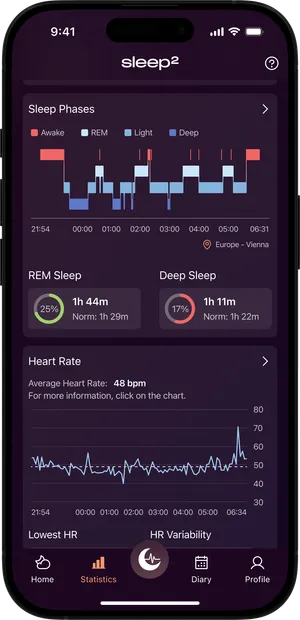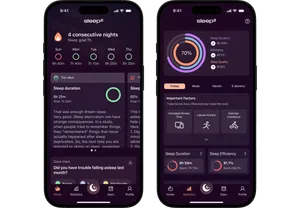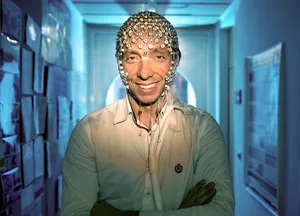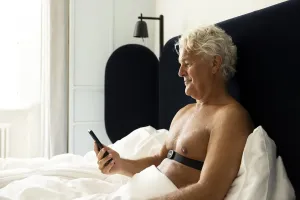
Research using sleep²
sleep² opens up new opportunities for sleep research. Studies can be conducted on a larger scale, over longer periods of time, and directly in participants’ everyday lives – with significantly less hardware and organizational effort. Researchers benefit from objective, scientifically validated sleep data that can be reliably analyzed and meet international standards. On request, they also gain access to raw data, enabling them to carry out their own analyses and address specific research questions with greater precision. This makes it easier to scale research projects, implement them with high quality, and integrate them flexibly into existing structures.
Researchers about sleep²

Peter Simor, Ph.D.
Associate Professor at Eötvös-Loránd University, Institute of Psychology (Budapest)
"The simple and immediate access to raw data is a great advantage for us, which we greatly appreciate when working with sleep² in research projects."

Dr. Lampros Perogamvros
Assistant Professor at UNIGE's Psychiatry Department and a psychiatrist at HUG
„For the implementation of studies on sleep disorders in everyday life, sleep² offers a valuable data basis.“

Thanh Dang-Vu, MD Ph.D.
Professor in der Abteilung für Gesundheit, Kinesiologie und angewandte Physiologie an der Concordia University
"In large cohort studies – particularly with sensitive participant groups such as older people – sleep² helps to collect precise sleep data in the familiar home environment."
-
Investigating the subjective and objective efficacy of a cognitive behavioural therapy for insomnia (CBT-I)-based smartphone app on sleep: A randomised controlled trial.
Hinterberger, A., Eigl, E.-S., Schwemlein, R. N., Topalidis, P., & Schabus, M. (2023). Investigating the subjective and objective efficacy of a cognitive behavioural therapy for insomnia (CBT-I)-based smartphone app on sleep: A randomised controlled trial. Journal of Sleep Research, [14136].
-
From Pulses to Sleep Stages: Towards Optimized Sleep Classification Using Heart-Rate Variability
Topalidis, P. I., Baron, S., Heib, D. P. J., Eigl, E-S., Hinterberger, A., & Schabus, M. (2023). From Pulses to Sleep Stages: Towards Optimized Sleep Classification Using Heart-Rate Variability. Sensors, 23(22), [9077]
-
The European Insomnia Guideline: an update on the diagnosis and treatment of insomnia 2023.
Riemann, D., Espie, C. A., Altena, E., Arnardottir, E. S., Baglioni, C., Bassetti, C. L., ... & Spiegelhalder, K. (2023). The European Insomnia Guideline: an update on the diagnosis and treatment of insomnia 2023. Journal of sleep research, 32(6), e14035.
-
The Virtual Sleep Lab—A Novel Method for Accurate Four-Class Sleep Staging Using Heart-Rate Variability from Low-Cost Wearables.
Topalidis, P., Heib, D. P. J., Baron, S., Eigl, E-S., Hinterberger, A., & Schabus, M. (2023). The Virtual Sleep Lab—A Novel Method for Accurate Four-Class Sleep Staging Using Heart-Rate Variability from Low-Cost Wearables. Sensors, 23(5), [2390].
-
Continuous sleep tracking in digital CBT-I: Efficacy and insights from a naturalistic-environment study
Hinterberger, A., Eigl, E.-S., Szeko, A., Topalidis, P. I., & Schabus, M. (2025). Continuous sleep tracking in digital CBT-I: Efficacy and insights from a naturalistic-environment study. International Journal of Clinical and Health Psychology, 25(4), Article 100646
-
On the Efficacy of a CBT-I-Based Online Program for Sleep Problems: A Randomized Controlled Trial.
Eigl, E-S., Hauser, T., Topalidis, P. I., & Schabus, M. (2023). On the Efficacy of a CBT-I-Based Online Program for Sleep Problems: A Randomized Controlled Trial. Clocks & Sleep, 5(4), 590-603.
-
The role of objective sleep duration, continuity, and architecture for subjective sleep perception: Findings from an intensive longitudinal study using heart-rate variability to infer objective sleep indicators.
Hachenberger, J., Baron, S., Schabus, M., & Lemola, S. (2025). The role of objective sleep duration, continuity, and architecture for subjective sleep perception: Findings from an intensive longitudinal study using heart-rate variability to infer objective sleep indicators. Sleep Medicine, 129, 167-174
-
The balance and integration of artificial intelligence within cognitive behavioral therapy interventions.
Nelson, J., Kaplan, J., Simerly, G., Nutter, N., Edson-Heussi, A., Woodham, B., & Broman-Fulks, J. (2025). The balance and integration of artificial intelligence within cognitive behavioral therapy interventions. Current Psychology, 1-11.
-
The effectiveness of smartphone app-based interventions for insomnia and sleep disturbances: A meta-analysis of randomized controlled trials.
Linardon, J., Anderson, C., McClure, Z., Liu, C., & Messer, M. (2024). The effectiveness of smartphone app-based interventions for insomnia and sleep disturbances: A meta-analysis of randomized controlled trials. Sleep Medicine.
-
Non-guided, Mobile, CBT-I-based Sleep Training in War-torn Ukraine: A Feasibility Study.
Kurapov, A., Blechert, J., Hinterberger, A., Topalidis, P., & Schabus, M. (2024). Non-guided, Mobile, CBT-I-based Sleep Training in War-torn Ukraine: A Feasibility Study. bioRxiv, 2024-08.
-
Soccer, sleep, repeat: effects of training characteristics on sleep quantity and sleep architecture.
Frytz, P., Heib, D. P., & Hoedlmoser, K. (2023). Soccer, sleep, repeat: effects of training characteristics on sleep quantity and sleep architecture. Life, 13(8), 1679.
-
The Effects of a CBT-I Based App-Program on Sleep Quality, Insomnia Severity, Psychological Strain and Quality of Life: A Pilot Study.
Hinterberger, A., Eigl, E.-S., Topalidis, P., & Schabus, M. (2025). The Effects of a CBT-I Based App-Program on Sleep Quality, Insomnia Severity, Psychological Strain and Quality of Life: A Pilot Study. Nature and Science of Sleep, 17, 2369-2385.
-
Exploring the Bidirectional Within-Subject Relationship Between Sleep and Affective Wellbeing: Insights from an Intensive Longitudinal Study.
Hachenberger, J., Kerkhoff, D., Baron, S., Schabus, M., & Lemola, S. (2025). Exploring the Bidirectional Within-Subject Relationship Between Sleep and Affective Wellbeing: Insights from an Intensive Longitudinal Study. International Journal of Clinical and Health Psychology (in press)
How it works

Data collection in everyday life
Participants wear standard POLAR H10 or Verity Sense sensors during sleep. These capture heart rate and inter-beat intervals (IBIs) with high temporal resolution and automatically transfer the data to the sleep² app. This way, sleep is documented objectively, precisely, and non-invasively in everyday life.
- Use of POLAR H10 or Verity Sense
- Automatic data transfer to the app
- Realistic measurement in the everyday life of the participants

Validated analysis and high data quality
The recorded data is processed by a scientifically validated algorithm. Researchers benefit from high accuracy in sleep phase detection and gain access to numerous metrics. Furthermore, raw data can also be exported to deepen their own analyses and inquiries.
- Validated sleep staging methodology with high accuracy
- Access to extensive sleep metrics (e.g., duration, efficiency, wake times)
- Option for export and access to raw data

Scalable research without a laboratory
sleep² enables large-scale studies without the need for complex laboratory infrastructure. Participants sleep in their familiar environment, which makes the results practical and ecologically valid. At the same time, the organizational effort is significantly reduced, making large field studies economically feasible.
- Conducting large-scale field studies
- Less hardware and organizational effort
- Research under natural conditions




